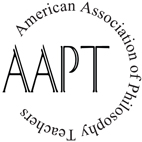The Lenssen Prize

The American Association of Philosophy Teachers recognizes and supports scholarship of the teaching and learning of philosophy in multiple ways, including the Lenssen Prize for the best paper regarding the teaching of philosophy.
In 2000 the American Association of Philosophy Teachers established the Lenssen Prize for the best paper regarding the teaching of philosophy in honor of Mark Lenssen.
The Lenssen Prize is offered for the best essay on the general theme of philosophy teaching that has appeared in the two calendar years before the AAPT biennial workshop-conference. Criteria used for evaluating essays include significance; struggle (e.g., does the paper have contested ideas?); originality; and quality of writing.
Nominations for the 2024 Lenssen Prize are open through November 18, 2023.
MARK LENSSEN (13 January 1949 – 17 March 1999)
Mark Lenssen received his undergraduate education at Pomona College, followed by graduate study at Northwestern University. He taught philosophy at Ohio Northern University from 1978 – when he arrived as an instructor – until his death. He was promoted to professor in 1992, and in 1993 he took over as chair of the Department of Philosophy and Religion. At his death, he was also Head of the Humanities Division and (in his spare time) the men’s tennis coach. Mark’s philosophic focus was the broad field of ethics – important figures in the history of ethics, as well as professional and environmental ethics – and he was so highly regarded as a teacher on the ONU campus that he was posthumously elected teacher of the year in 1999. Among his other professional activities, Mark was a tireless worker for AAPT. He served for many years as the co-editor of AAPT News, working to make writing about the teaching of philosophy better and more available.
Lenssen Prize Winners
2022
Recipient: VAUGHN BRYAN BALTZLY, “Trolleyology as First Philosophy: A Puzzle-Centered Approach to Introducing the Discipline” Teaching Philosophy 44:4 (December 2021). Honorable Mention: Marie-France Daniel, “In the Footsteps of Matthew Lipman: Dialogue among Peers and Dialogical Thinking,” Analytic Teaching and Philosophical Praxis 41.1 (2021). Mark Walker, “The Skills-First vs. Content-First Philosophy Class,” Teaching Philosophy 44:1, March 2021.2020
Recipient: MELISSA JACQUART, REBECCA SCOTT, KEVIN HERMBERG, and STEPHEN BLOCH-SCHULMAN, “Diversity Is Not Enough: The Importance of Inclusive Pedagogy.” Teaching Philosophy 42, no. 2 (2019). Honorable Mention: Victor Fabian Abundez-Guerra, “How to Deal with Kant’s Racism—In and Out of the Classroom.” Teaching Philosophy 41, no. 2 (2018). John Capps, “The Case for Discussion-Intensive Pedagogy,” APA Newsletter on Teaching. 17:2 (2018). Gwen Daugs, “Rancière and Pedagogy: Knowledge, Learning, and the Problem of Distraction,” American Association of Philosophy Teachers Studies in Pedagogy (2019).2018 (co-winners)
Recipient: ANDREW J. PIERCE, “Interest Convergence: An Alternative to White Privilege Models of AntiRacist Pedagogy and Practice,” Teaching Philosophy, 39, no.4 (2016). Recipient: MATT S. WHITT, “Other People’s Problems: Student Distancing, Epistemic Responsibility, and Injustice,” Studies in Philosophy and Education, 35, no. 5 (2016).2016
Recipient: KATE PADGETT WALSH, ANASTASIA PROKOS, and SHARON R. BIRD, “Building a Better Term Paper: integrating scaffolded writing and peer review,” Teaching Philosophy, 37:4 (Dec. 2014). Honorable Mention: Tom Dougherty, Samuel Baron, Kristie Miller, “Female Under-Representation Among Philosophy Majors: a map of the hypotheses and a survey of the evidence,” Feminist Philosophy Quarterly 1/1 (2015). Paul Green, “How to Motivate Students: a primer for learner-centered teachers,” AAPT Studies in Pedagogy 1 (2015), 47-60.2014
Recipient: ANN J. CAHILL and STEPHEN BLOCH-SCHULMAN “Argumentation Step-By-Step: Learning Critical Thinking through Deliberative Practice,”Teaching Philosophy, 35:1 (2012): 41-62. Honorable Mention: Emily Esch, “A Cognitive Approach to Teaching Philosophy,” Teaching Philosophy, 36:2. Jeffrey Maynes, “Thinking about Critical Thinking,” Teaching Philosophy, 36:4. Patrick Stokes, “Philosophy Has Consequences! Developing Metacognition and Active Learning in the Ethics Classroom,” Teaching Philosophy, 35:2.2012
Recipient: JOHN RUDISILL for “The Transition from Studying Philosophy to Doing Philosophy,” Teaching Philosophy 34:3 (2011): 241-271. Honorable Mention: Stephen Bloch-Schulman, “When the ‘Best Hope’ Is Not So Hopeful, What Then? Democratic Thinking, Democratic Pedagogies, and Higher Education,” Journal of Speculative Philosophy, 24:4 (2010). Cynthia Coe, “Scaffolded Writing as a Tool for Critical Thinking: Teaching Beginning Students How to Write Arguments,” Teaching Philosophy, 34:1 (2011). John Immerwahr, “The Case for Motivational Grading,” Teaching Philosophy 34:4 (2011).2010
Recipient: DARYLCLOSE for “Fair Grades,” Teaching Philosophy, 32:4 (2009): 361-398. Honorable Mention:
Alexandra Bradner, “Teaching Modernity in Appalachia,” Teaching Philosophy 31:3 (2008); J. Carl Ficarrota, “How to Teach a Bad Ethics Course,” Teaching Philosophy 32:1 (2009). Margaret Watkins, “Persuasion and Pedagogy: On Teaching Ethics with Jane Austen,” Teaching Philosophy 31:4 (2008).2008
No prize awarded2006
Recipient: DAVID W. CONCEPCIÓN, “Reading Philosophy with Background Knowledge and Metacognition,” Teaching Philosophy 27:4 (2004).2004
Recipient: JAMES CAMPBELL, “The Ambivalence Toward Teaching In The Early Years Of The American Philosophical Association,” Teaching Philosophy 25:1 (March 2002).2002
Recipient: DEBORAH R. BARNBAUM, “Teaching Empathy in Medical Ethics: The Use of ‘Lottery Assignments’,” Teaching Philosophy 24:1 (March 2001).


